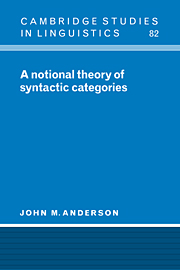1 - Prelude
Published online by Cambridge University Press: 14 August 2009
Summary
‘In the beginning was what word?’ Arthur asked.
This book is concerned with word classes and their categorisation, where word is taken to be the basic unit of the syntax and their classification is determined by this syntax, i.e. how they combine to form sentences. It is specifically concerned with the ‘substance’ of class labels (traditionally, ‘noun’, ‘verb’, etc.) and with what role this ‘substance’ plays in the syntax. The chapters which succeed this one are concerned to lay out and motivate a particular approach to the ‘substance’ of word categorisation, one which I have dubbed ‘notional’, in so far as it is conceived of as an extension of those ‘traditional’ grammars that saw this ‘substance’ as ontologically based. A more immediate antecedent is some suggestive work of Lyons (e.g. 1966; 1977: ch. 11; 1989); and the approach seems to me a natural extension of my earlier work on ‘case grammar’ (e.g. Anderson 1971a; 1977; 1980b; 1984b; 1986b), as I have indicated elsewhere (Anderson 1989b; 1992b). The present brief chapter is intended, as described by its title, as a ‘prelude’ to the main discussion, in providing in brief some context for the assumptions and intentions that inform the latter. It does not attempt to provide a historiography of word-class studies, or even of notionalism: these warrant substantial treatment on their own account.
Information
- Type
- Chapter
- Information
- A Notional Theory of Syntactic Categories , pp. 1 - 12Publisher: Cambridge University PressPrint publication year: 1997
